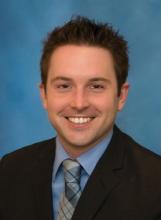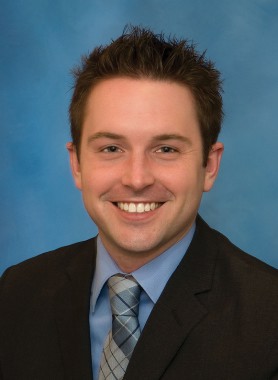User login
WASHINGTON – Delays in esophageal cancer surgery after a course of neoadjuvant chemotherapy and radiation were associated with more surgical complications and worse survival, based on the results of a retrospective study presented at the annual clinical congress of the American College of Surgeons.
Clinicians should focus on "prehabilitating" their patients, completing their neoadjuvant therapy and recommending esophagectomy as soon as clinically feasible, Dr. Nicholas Teman said.
Dr. Teman and his colleagues at the University of Michigan, Ann Arbor, reviewed prospectively collected data from the period of 1999-2010 on 457 patients treated at a single site. All patients underwent neoadjuvant chemotherapy and radiation with a subsequent esophagectomy; patients who underwent salvage esophagectomies were excluded from the analysis.
Outcome measures included postoperative pulmonary adverse events, anastomotic leaks, pathologic response, and mortality.
The mean time to surgery after chemotherapy and radiation was 50 days, ranging between 10 and 523 days. The most common reasons for surgical delays were patient deconditioning, noncompliance, seeking a second opinion, and complications stemming from neoadjuvant therapies.
When the time from completion of neoadjuvant therapy to surgery was analyzed as a continuous variable, there were no differences in postoperative complications and mortality. Similarly, postoperative staging and pathologic response were not significantly different.
Additionally, outcomes did not significantly differ for those who had surgery within 8 weeks of completing chemotherapy and radiation and those who had surgery after 8 weeks.
However, when time to surgery was used to place patients into quintiles of 8 weeks or less (n = 345), 9-12 weeks (n = 58), 13-16 weeks (n = 27), 17-26 weeks (n = 19), and 27 or more weeks (n = 8), there were significant differences in pulmonary complications (P = .05) and anastomotic leaks (P = .02), and a trend toward worse mortality between the quintiles (P = .09). No significant differences in pathologic response were noted in the quintiles.
Predictors of higher long-term mortality were lower pretreatment weight (P = .04), tobacco use (P = .05), higher pretreatment stage (P = .004), and failure to complete neoadjuvant treatment (P = .003).
One limitation of the study was that the neoadjuvant therapies were not standardized. A shorter time to surgery was predicted if chemotherapy included cisplatin (P = .04) or taxol (P = .001), and if there were increasing chemotherapy cycles. Chemotherapy that included 5-flourouracil was associated with longer times to surgery (P less than .001).
Dr. Teman and his associates reported no relevant disclosures.
WASHINGTON – Delays in esophageal cancer surgery after a course of neoadjuvant chemotherapy and radiation were associated with more surgical complications and worse survival, based on the results of a retrospective study presented at the annual clinical congress of the American College of Surgeons.
Clinicians should focus on "prehabilitating" their patients, completing their neoadjuvant therapy and recommending esophagectomy as soon as clinically feasible, Dr. Nicholas Teman said.
Dr. Teman and his colleagues at the University of Michigan, Ann Arbor, reviewed prospectively collected data from the period of 1999-2010 on 457 patients treated at a single site. All patients underwent neoadjuvant chemotherapy and radiation with a subsequent esophagectomy; patients who underwent salvage esophagectomies were excluded from the analysis.
Outcome measures included postoperative pulmonary adverse events, anastomotic leaks, pathologic response, and mortality.
The mean time to surgery after chemotherapy and radiation was 50 days, ranging between 10 and 523 days. The most common reasons for surgical delays were patient deconditioning, noncompliance, seeking a second opinion, and complications stemming from neoadjuvant therapies.
When the time from completion of neoadjuvant therapy to surgery was analyzed as a continuous variable, there were no differences in postoperative complications and mortality. Similarly, postoperative staging and pathologic response were not significantly different.
Additionally, outcomes did not significantly differ for those who had surgery within 8 weeks of completing chemotherapy and radiation and those who had surgery after 8 weeks.
However, when time to surgery was used to place patients into quintiles of 8 weeks or less (n = 345), 9-12 weeks (n = 58), 13-16 weeks (n = 27), 17-26 weeks (n = 19), and 27 or more weeks (n = 8), there were significant differences in pulmonary complications (P = .05) and anastomotic leaks (P = .02), and a trend toward worse mortality between the quintiles (P = .09). No significant differences in pathologic response were noted in the quintiles.
Predictors of higher long-term mortality were lower pretreatment weight (P = .04), tobacco use (P = .05), higher pretreatment stage (P = .004), and failure to complete neoadjuvant treatment (P = .003).
One limitation of the study was that the neoadjuvant therapies were not standardized. A shorter time to surgery was predicted if chemotherapy included cisplatin (P = .04) or taxol (P = .001), and if there were increasing chemotherapy cycles. Chemotherapy that included 5-flourouracil was associated with longer times to surgery (P less than .001).
Dr. Teman and his associates reported no relevant disclosures.
WASHINGTON – Delays in esophageal cancer surgery after a course of neoadjuvant chemotherapy and radiation were associated with more surgical complications and worse survival, based on the results of a retrospective study presented at the annual clinical congress of the American College of Surgeons.
Clinicians should focus on "prehabilitating" their patients, completing their neoadjuvant therapy and recommending esophagectomy as soon as clinically feasible, Dr. Nicholas Teman said.
Dr. Teman and his colleagues at the University of Michigan, Ann Arbor, reviewed prospectively collected data from the period of 1999-2010 on 457 patients treated at a single site. All patients underwent neoadjuvant chemotherapy and radiation with a subsequent esophagectomy; patients who underwent salvage esophagectomies were excluded from the analysis.
Outcome measures included postoperative pulmonary adverse events, anastomotic leaks, pathologic response, and mortality.
The mean time to surgery after chemotherapy and radiation was 50 days, ranging between 10 and 523 days. The most common reasons for surgical delays were patient deconditioning, noncompliance, seeking a second opinion, and complications stemming from neoadjuvant therapies.
When the time from completion of neoadjuvant therapy to surgery was analyzed as a continuous variable, there were no differences in postoperative complications and mortality. Similarly, postoperative staging and pathologic response were not significantly different.
Additionally, outcomes did not significantly differ for those who had surgery within 8 weeks of completing chemotherapy and radiation and those who had surgery after 8 weeks.
However, when time to surgery was used to place patients into quintiles of 8 weeks or less (n = 345), 9-12 weeks (n = 58), 13-16 weeks (n = 27), 17-26 weeks (n = 19), and 27 or more weeks (n = 8), there were significant differences in pulmonary complications (P = .05) and anastomotic leaks (P = .02), and a trend toward worse mortality between the quintiles (P = .09). No significant differences in pathologic response were noted in the quintiles.
Predictors of higher long-term mortality were lower pretreatment weight (P = .04), tobacco use (P = .05), higher pretreatment stage (P = .004), and failure to complete neoadjuvant treatment (P = .003).
One limitation of the study was that the neoadjuvant therapies were not standardized. A shorter time to surgery was predicted if chemotherapy included cisplatin (P = .04) or taxol (P = .001), and if there were increasing chemotherapy cycles. Chemotherapy that included 5-flourouracil was associated with longer times to surgery (P less than .001).
Dr. Teman and his associates reported no relevant disclosures.
AT THE ACS CLINICAL CONGRESS
Major finding: When time to surgery was used to place patients into quintiles of 8 weeks or less (n = 345), 9-12 weeks (n = 58), 13-16 weeks (n = 27), 17-26 weeks (n = 19), and 27 or more weeks (n = 8), there were significant differences in pulmonary complications (P = .05) and anastomotic leaks (P = .02), and a trend toward worse mortality between the quintiles (P = .09).
Data source: Retrospective review of prospective data on 457 patients treated from 1999-2010 at a single surgical site.
Disclosures: Dr. Teman and his associates reported no relevant disclosures.

